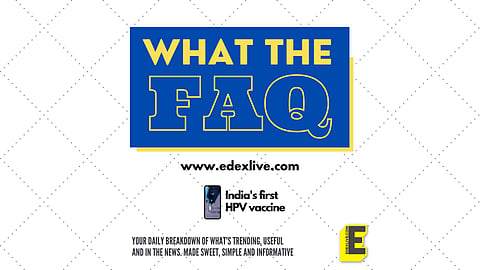

A report by ANI stated that the HPV vaccine is expected to arrive in India by April-May next year at one-tenth of the cost of internationally branded vaccines in the country, according to Dr NK Arora, Chairman of COVID working group, National Technical Advisory Group on Immunisation (NTAGI). The vaccine Cervavac is an outcome of partnership between Department of Biotechnology (DBT) and Biotechnology Industry Research Assistance Council (BIRAC) with the Bill and Melinda Gates Foundation supported by the Serum Institute of India, as per the report by ANI. It also stated that they are aiming to roll out the vaccine as part of a national programme for girls aged between 9 to 14 years.
Why is the vaccine critical to India's fight against cervical cancer? What challenges has the immunisation process faced so far? Today's FAQ will dive into these questions and more.
What is HPV?
Human papillomavirus (HPV) is the most common viral infection of the reproductive tract. Most sexually active women and men will be infected at some point in their lives and some may be repeatedly infected, as per the World Health Organisation (WHO). Cervical cancer is by far the most common HPV-related disease. In fact, nearly all cases of cervical cancer can be attributed to HPV infection, the WHO said in a report.
What is the rate of cervical cancer cases in India?
A study published in The Lancet Global Health journal on Wednesday, December 14 revealed that India accounted for 20.5 per cent of cases and 22.6 per cent of deaths due to cervical cancer globally, in 2020. It stated that in 2020, 1,23,907 cases and 77,348 deaths were reported from India due to cervical cancer. The study, while noting that the incidence of cases has decreased in many world regions in the past three decades, stated that the rates and burden of the cases still remain high globally. Additionally, according to WHO, 4.1 million women in India have died from the disease since 2019, and without intervention, as many as 5.7 million will die by 2070.
Are there any existing vaccines against HPV-related cervical cancer in India?
Two vaccines licensed globally are available in India — a quadrivalent vaccine (Gardasil from Merck) and a bivalent vaccine (Cervarix from GlaxoSmithKline). Each dose costs Rs 2,800 per dose (Gardasil) or Rs 3,299 (Cervarix), as per a study in the Indian Journal of Medical and Paediatric Oncology. The HPV vaccine has been licensed for use in India by the Drug Controller General of India since 2008. The new vaccine will be priced between Rs 200 - Rs 400 per dose as per reports.
What challenges has the immunisation programme faced in India?
A study by Lancet published in October 2022 stated that although HPV vaccines have been available in the country since 2008, attempts to establish a national vaccination programme have stalled, mainly due to "unfounded worries about side-effects, as well as affordability concerns." Moreover, "poor awareness of cervical cancer, low screening uptake, insufficient availability of and access to vaccines, and screening and vaccine reluctance", have been attributed to a high burden of cases in the country. Additionally, the study also noted that the COVID-19 pandemic has created a new group of susceptible women due to the decrease in screening intensity and detection of cervical precancers.
Were some vaccine programmes suspended earlier?
A vaccine delivery and demonstration project led by an international nonprofit organisation, PATH, was started in 2009 in Andhra Pradesh and Gujarat, according to a study published in the American Society of Clinical Oncology Journal. This project however was later suspended in 2010 following the alleged deaths of seven girls who received the HPV vaccine. However, upon further investigations, it was found that the deaths were not linked to vaccination but occurred as a result of varied unrelated causes, the study said.
